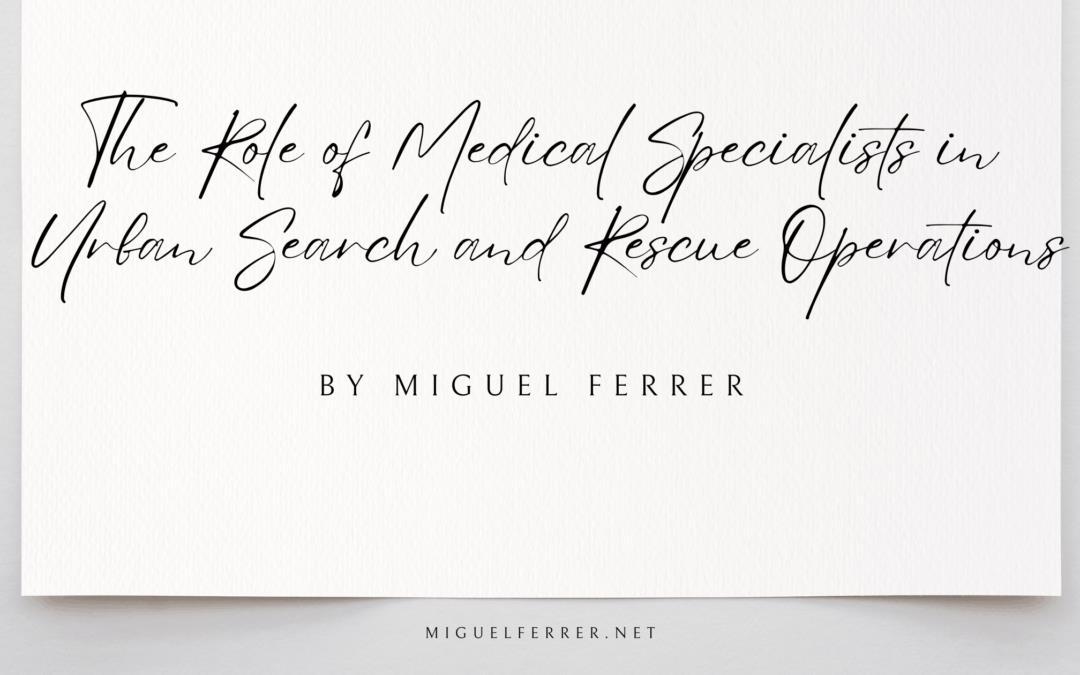The Role of Medical Specialists in Urban Search and Rescue Operations
by Miguel Ferrer | Dec 2, 2024 | Miguel Ferrer, Healthcare

When disaster strikes in urban areas, the urgency to save lives is unmatched. Urban search and rescue (USAR) teams are often at the forefront of such operations, comprising highly skilled professionals, including medical specialists. These medical experts play a critical role in stabilizing victims, providing life-saving care, and ensuring safe extraction from perilous situations. This blog explores the multifaceted responsibilities of medical specialists in USAR operations and the challenges they face in such high-stakes environments.
Understanding Urban Search and Rescue (USAR)
Urban search and rescue is a specialized field that involves locating, extricating, and providing medical assistance to victims trapped in confined spaces or hazardous environments. Whether it’s an earthquake, building collapse, or a terrorist attack, USAR teams are trained to operate under extreme conditions. Medical specialists are an integral part of these teams, ensuring that victims receive critical care before being transported to a hospital.
USAR operations are unique due to the urban landscape dense populations, infrastructure complexities, and potential secondary hazards like gas leaks or fires. Medical specialists in this field must be adept at working with minimal resources and under intense pressure.
Core Responsibilities of Medical Specialists in USAR
1. Triage and Immediate Care
One of the primary responsibilities of a medical specialist in USAR operations is to conduct rapid triage. In a disaster zone, there are often more victims than resources. Specialists must
assess who needs immediate attention, who can wait, and who, unfortunately, may not survive without extensive resources.
Immediate care includes stabilizing patients with injuries such as fractures, burns, or crush syndrome. Advanced techniques like field intubation or administering IV fluids on-site are crucial in these moments.
2. Medical Oversight During Extrication
Extricating a victim from rubble or collapsed structures can take hours, sometimes days. Medical specialists monitor the victim’s condition during the process, ensuring oxygen levels, heart rates, and other vital signs remain stable. They communicate with rescue technicians to adjust strategies based on the patient’s medical needs.
3. Preventing Secondary Injuries or Infections
In disaster scenarios, hygiene is a major concern. Open wounds are susceptible to infection, and medical specialists must clean and dress injuries immediately. They may also administer tetanus shots or antibiotics when necessary.
4. Psychological First Aid
Beyond physical injuries, victims often suffer from shock or trauma. Medical specialists trained in psychological first aid provide reassurance and comfort, which can significantly impact a victim’s recovery.
Challenges Faced by Medical Specialists in USAR
1. Resource Constraints
Disaster zones rarely have the luxury of fully stocked medical supplies. Specialists must rely on their ingenuity, using limited resources efficiently. For example, improvising splints from available materials or administering fluids with makeshift equipment.
2. Hazardous Working Conditions
Operating in unstable buildings, with risks of aftershocks or fires, puts medical specialists in constant danger. They must prioritize their safety while ensuring the victims receive care.
3. Coordination with Multi-Disciplinary Teams
USAR teams include engineers, firefighters, canine units, and logistics experts. Medical specialists must work seamlessly with these professionals, often under chaotic conditions.
4. Emotional Toll
Witnessing mass casualties and managing the expectations of desperate survivors can take a significant emotional toll on specialists. Long hours and the weight of life-or-death decisions add to the stress.
Training and Skills Required
Medical specialists in USAR need a combination of advanced medical training and disaster management expertise. Certifications like Advanced Trauma Life Support (ATLS) and training in confined space rescue are prerequisites. Many specialists also pursue degrees in disaster management to understand the broader scope of emergency response.
Soft skills like adaptability, communication, and decision-making are equally important. In a field where seconds can mean the difference between life and death, these qualities are indispensable.
Real-Life Impact: Stories from the Field
One notable example is the 2010 Haiti earthquake, where USAR teams from around the world saved thousands of lives. Medical specialists played a pivotal role in stabilizing victims trapped under rubble for days, delivering care in makeshift field hospitals, and preventing infectious outbreaks.
Another example is the Surfside condominium collapse in Florida in 2021. Medical specialists on-site worked tirelessly to ensure that trapped survivors received immediate care, even as the structure posed significant risks.
Medical specialists in urban search and rescue operations are unsung heroes. Their ability to provide life-saving care in the most challenging conditions is a testament to their dedication and expertise. As urban areas continue to grow and disasters become more frequent due to climate change and other factors, the role of medical specialists in USAR will only become more critical.
By investing in their training, resources, and mental well-being, we can ensure that these professionals are always ready to answer the call of duty. Their contributions not only save lives but also inspire hope in the face of unimaginable adversity.
